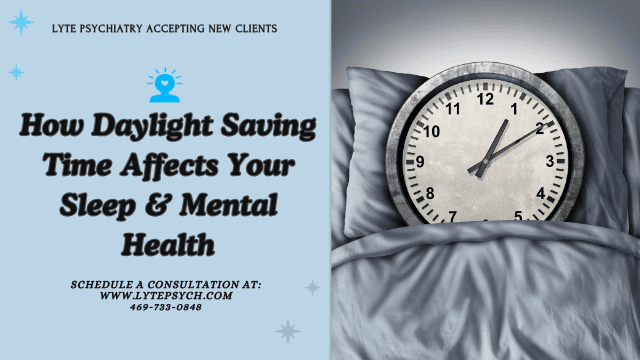Fri Mar 07 2025
How Daylight Saving Time Affects Your Sleep & Mental Health at Lyte Psychiatry (Affordable Therapist and Psychiatrist Near You), Best Adults and Adolescents Therapist and Psychiatrist Near You, Dallas, TX

How Daylight Saving Time Affects Your Sleep & Mental Health at Lyte Psychiatry (Affordable Therapist and Psychiatrist Near You)
When the clocks spring forward or fall back, our daily routines often get thrown off balance. While a single-hour shift might not seem like a big deal, its effects on sleep and mental health can be more significant than you think. If you’ve ever felt groggy, moody, or out of sync after the time change, you’re not alone.
Here’s how Daylight Saving Time (DST) can affect your mind and body—and how Lyte Psychiatry in Dallas, TX, can help ease the transition.
Why Does Daylight Saving Time Matter?
DST was originally introduced to maximize daylight hours, but the time shift can disrupt your circadian rhythm—the internal 24-hour clock that regulates sleep, mood, and overall well-being. Whether you’re losing an hour in spring or gaining one in fall, your body needs time to adjust. This seemingly minor disruption can impact your energy levels, mood stability, and ability to concentrate.
How DST Affects Sleep & Mental Health
Disrupted Sleep Patterns:
Even a one-hour shift can throw off your internal clock, making it harder to fall asleep or wake up feeling refreshed. Quality sleep may decrease, leaving you feeling restless and fatigued.
Increased Daytime Fatigue:
Mood Changes & Irritability:
Difficulty Concentrating:
Higher Stress Levels:
Tips to Help Your Body Adjust
Make Gradual Adjustments: Start adjusting your sleep schedule a few days before DST by going to bed 15 minutes earlier (or later, depending on the season). This small change can make the transition smoother.
Stick to a Consistent Routine: A predictable bedtime routine—such as reading, stretching, or listening to calming music—can help signal your body that it’s time to rest.
Limit Caffeine & Screen Time Before Bed: Caffeine and blue light from screens can interfere with melatonin production, making it harder to fall asleep. Try to limit both at least an hour before bedtime.
Get Morning Sunlight: Natural light helps reset your internal clock. Spending time outside in the morning can help your body adjust to the new schedule more quickly.
Stay Active During the Day: Regular exercise promotes better sleep. Even a short walk or light workout can help regulate your circadian rhythm.
Need Help Adjusting? Lyte Psychiatry is Here for You
If DST or any other factor is disrupting your sleep and mood, don’t struggle alone. At Lyte Psychiatry in Dallas, TX, we offer affordable, compassionate mental health care for adolescents and adults. Our team is here to provide personalized support, whether you need therapy, medication management, or a combination of both. Adjusting to Daylight Saving Time can be tough, but you don’t have to navigate sleep disturbances and mood changes alone.
To see our services. Click Here
To Schedule an appointment. Click Here
Call us if you have questions at 469-733-0848
Frequently Asked Questions (FAQ)
Q: How long does it take to adjust to Daylight Saving Time?
A: Most people adapt within a week or two, but those with existing sleep issues may need more time.
Q: Can diet changes help with DST adjustment?
A: Yes! A balanced diet supports good sleep. Avoid heavy meals and sugary snacks before bedtime to improve sleep quality.
Q: Are children and teenagers affected differently by DST?
A: Yes, younger individuals tend to be more sensitive to sleep disruptions. Sticking to a consistent bedtime routine is especially important for them.
Q: Is it normal to feel anxious or depressed after the time change?
A: Many people experience increased stress, anxiety, or low mood due to sudden sleep pattern changes. If symptoms persist, seeking professional support is a great option.
Q: Does Lyte Psychiatry treat both sleep disorders and mood conditions?
A: Absolutely. We provide treatment for a range of mental health concerns, including insomnia, anxiety, and depression, with therapy and/or medication management.